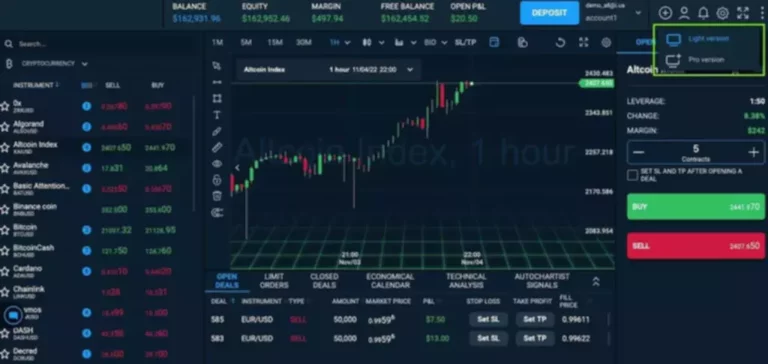Content
This interoperability allows you to manage various digital assets within a single interface. You can trade a wide range of cryptocurrencies, participate in community activities, and explore DApps across different blockchain ecosystems. A crypto wallet is a digital tool that allows you to interact with blockchain networks to store Financial cryptography and manage cryptocurrencies.
What is the difference between a crypto exchange and a brokerage?
If you’re concerned about getting locked out of your Bitcoin wallet, you may focus on those providers who retain whats a crypto wallet custody of your key. However, if the lack of centrality of crypto is what appeals to you, you may opt for a crypto wallet where you retain complete control of your key—and, by extension, your coins. In a paper wallet, you print off your key, typically a QR code, on a paper document. This makes it impossible for a hacker to access and steal the password online, but then you need to protect the physical document.

What Is a Crypto Wallet? Types of Crypto Wallets to Know.
You can also track your crypto balance and transactions and swap one cryptocurrency for another. Cold wallets are essentially thumb drives or another type of hardware device. “Once you have one, you simply transfer your coins from your hot wallet to your cold wallet,” Edelman says. Likewise, the person who holds a private key has full access to the crypto. In layman’s terms, a cryptocurrency exchange is a place where you meet and exchange cryptocurrencies with another person. The exchange platform (i.e. Binance) acts as a middleman – it connects you (your offer or request) https://www.xcritical.com/ with that other person (the seller or the buyer).
Which Type of Crypto Wallet Is the Best?
You can send and receive cryptocurrency, check your balance, and interact with decentralized applications at all times. This accessibility is especially useful for individuals who are unbanked, want to take control of their finances, or participate in the decentralized economy. Just like keeping fiat money in a wallet, you’ll need a tool to store your bitcoin, ether, and other coins and tokens. The crypto wallet keeps track of how much cryptocurrency you have and lets you send and receive digital assets. Non-custodial wallets are the types of wallets that put you in control of your own data.
- Crypto wallets store your private crypto keys and provide access to the blockchain or crypto-related services.
- Forbes’ site is not tailored to a specific reader’s or prospective reader’s current or future investment portfolio, investment objectives, or other needs.
- You store it in a safe – one that has a digital lock that can be accessed by entering the right combination of numbers.
- Most of them can sign cryptocurrency transactions automatically without requiring you to enter the key, circumventing a hacker’s ability to log your keypresses or record your screen.
- While pros say “wallet” to describe what safeguards your cryptocurrency, it’s more accurate to think of it as holding keys to a virtual address where your holdings are attributed.
An additional degree of protection is added by this offline-signing procedure, which shields users from internet dangers. Private keys are created offline using a hardware random number generator or computer that has totally no connection to the internet. As the value of cryptocurrencies increases, you need to figure out a trustworthy method to manage and safely store your keys. When covering investment and personal finance stories, we aim to inform our readers rather than recommend specific financial product or asset classes. These involve a crypto wallet application tied to your mobile phone, allowing you to trade and manage your finances on the go. That said, plenty more options don’t do more than just provide a simple graphical interface where you can see what you have and very little else.
With a non-custodial wallet, you are the only one who has access to your private keys. This might sound like a recipe for disaster (after all, if you lose your keys, you lose your crypto), but non-custodial wallets actually offer two big advantages. If you choose this type of wallet, you’re essentially outsourcing your private keys to them. If you wish to access and send coins from this type of wallet, you log into your account and enter the location where you want to send your crypto. Non-custodial wallets, on the other hand, allow a user to retain full control of their funds, since the private key is stored locally with the user.

Crypto wallets all begin with a private key, a long, randomized string of letters and numbers. These private keys can also take the form of a QR code or mnemonic phrase. In the cryptocurrency space, smart contracts are digitally signed in the same way a cryptocurrency transaction is signed. Custodial wallets, on the other hand, are wallets offered by crypto businesses such as crypto exchanges like Gemini Wallet, BlockFi Wallet or eToro.
Online risks like malware and spyware cannot affect cold wallets since they are not connected to the internet. That wraps up my introduction to what is a crypto wallet, their types, and how do these wallets work. Check out other sections of this chapter to learn even more about crypto wallets. While concepts as vast as cryptocurrency wallets can feel really overwhelming, when you’re just getting into it, the golden rule is to start off from the very beginning, and work your way on from there. When you’re just starting out with crypto, there are a few “essential” things that you need to figure out and understand, as soon as possible.
Dedicated secure components, or tamper-resistant chips, are used in many hardware wallets to shield private keys from both software and physical threats. In comparing various financial products and services, we are unable to compare every provider in the market so our rankings do not constitute a comprehensive review of a particular sector. While we do go to great lengths to ensure our ranking criteria matches the concerns of consumers, we cannot guarantee that every relevant feature of a financial product will be reviewed. However, Forbes Advisor Australia cannot guarantee the accuracy, completeness or timeliness of this website. Though there is a definite line between hardware and software wallets, the line blurs a little at times.
When choosing between a custodial or non-custodial wallet, there is no perfect choice. With these factors in mind, a categorical “best” crypto wallet does not exist, Leinweber says, as each wallet has its strengths and weaknesses. Cryptocurrency is a highly abstract store of value, without a physical token similar to cash’s coins and bills.

Therefore, this compensation may impact how, where and in what order products appear within listing categories, except where prohibited by law for our mortgage, home equity and other home lending products. Other factors, such as our own proprietary website rules and whether a product is offered in your area or at your self-selected credit score range, can also impact how and where products appear on this site. While we strive to provide a wide range of offers, Bankrate does not include information about every financial or credit product or service. Of course, you can split the difference here, just as you would in the real world. You don’t go walking around with your whole net worth in your physical wallet. You keep most of your assets in a secure place — a bank, for example — and go out only with what you need.
You can also have some funds in a hot wallet and maintain the rest offline in a hardware wallet. That’s the advantage of cryptocurrency, it gives you complete autonomy over how you want your funds stored, managed and protected. As the name implies, desktop wallets are software applications that users download and run locally on their computers.
Contrary to popular belief, crypto wallets don’t actually store digital assets. Instead, they provide the tools necessary to access and spend your crypto holdings. In other words, these wallets can generate the necessary information to send and receive cryptocurrency via blockchain transactions. This information includes one or more pairs of public and private keys. When looking at the different types of crypto wallets, keep in mind you aren’t limited to one type. For instance, many of the major hardware wallets integrate with mobile and browser-based wallets.

Leave A Comment